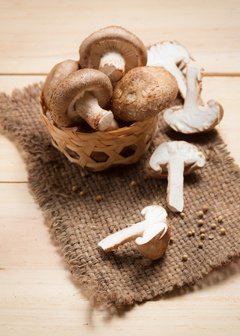
22 Oct Why Shiitake Mushrooms Are Good For You
It is never too early to promote the Telluride Institute’s Telluride Mushroom Festival. Or the cascading environmental and health benefits of fungi in general. For example, penicillin, streptomycin, and tetracycline all come from fungal extracts. The potent anti-inflammatory characteristics of Cordyceps could prove helpful for mitigating the impact of asthma, stroke, and arthritis. They also are shown to have antidepressant effects, aid in normalizing cholesterol levels, and more. Some mushrooms, particularly Turkey Tail and Reishi, appear to contain an arsenal of cancer-busting compounds. This article by Kerri-Ann Jennings, MS, RD, about the benies of shiitake mushroom, just one of hundreds of fungi as our friends and helpers, was published in Authority Nutrition.

Shiitake mushrooms are one of the most popular mushrooms worldwide.
They are prized for their rich, savory taste and diverse health benefits.
Compounds in shiitakes may help fight cancer, boost immunity and support heart health.
This article explains everything you need to know about shiitake mushrooms.
What Are Shiitake Mushrooms?
Shiitakes are edible mushrooms native to East Asia.
They’re tan to dark brown in color, and the caps usually grow to between 2 and 4 inches (5 and 10 centimeters).
While typically used as vegetables, shiitakes are actually a fungus that grows naturally on decaying hardwood trees.
They’re also widely grown. 83% of shiitakes are grown in Japan, although the US, Canada, Singapore and China also produce them (1).
You can find them fresh, dried or in various dietary supplements.
Nutrition Profile of Shiitake Mushrooms
Shiitakes are low in calories. They also offer good amounts of fiber, as well as B vitamins and some minerals.
Here are the nutrients you get in four dried shiitakes (15 grams) (2):
- Calories: 44.
- Carbs: 11 grams.
- Fiber: 2 grams.
- Protein: 1 gram.
- Riboflavin: 11% of the RDI.
- Niacin: 11% of the RDI.
- Copper: 39% of the RDI.
- Vitamin B5: 33% of the RDI.
- Selenium: 10% of the RDI.
- Manganese: 9% of the RDI.
- Zinc: 8% of the RDI.
- Vitamin B6: 7% of the RDI.
- Folate: 6% of the RDI.
- Vitamin D: 6% of the RDI.
In addition, shiitakes contain many of the same amino acids as meat (3).
They also contain polysaccharides, terpenoids, sterols and lipids linked to immune-boosting, cholesterol-lowering and anti-cancer effects (4).
All of these properties can differ, depending on how and where the mushrooms are grown, stored and used (3).
Bottom Line: Shiitake mushrooms are low in calories. They also offer many vitamins, minerals and other health-promoting compounds.
How Are They Used?
Shiitake mushrooms have two main uses: as food and as supplements.
Shiitakes as Whole Foods
You can cook with both fresh and dried shiitakes, although the dried mushrooms are slightly more popular.
Dried shiitakes have an umami flavor that’s even more intense than when they’re fresh.
Umami means savory and delicious. It is described as the “fifth taste” along with sweet, sour, bitter and salty.
Both dried and fresh shiitake mushrooms are used in stir-fries, soups, stews and other dishes.
Shiitakes as Supplements…
Continue reading here to understand how shiitakes might boost your immune system, fight cancer, strengthen bones and how to cook with shiitake.




Sorry, the comment form is closed at this time.